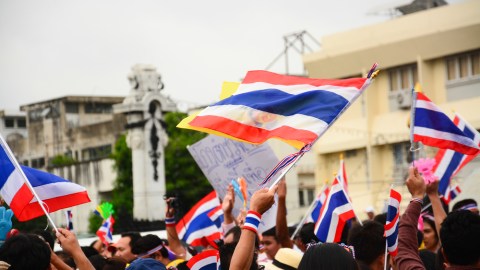How the Right to Rebellion is a Double-Edged Sword

What’s the Latest?
Daniel Lansberg-Rodriguez of The Atlantic has authored a fascinating piece about nations whose constitutions grant citizens the right to resist the government. Lansberg-Rodriguez notes that Thailand’s recent coup came after various factions invoked Section 69 of their now-suspended Constitution. Protesters in Venezuela, though never as successful as the Thai, frequently invoke their own right to resist the government:
“ARTICLE 350: The people of Venezuela, true to their republican tradition and their struggle for independence, peace and freedom, shall disown any regime, legislation or authority that violates democratic values, principles and guarantees or encroaches upon human rights.”
History has found that unstable countries such as Thailand and Venezuela tend to draft far more constitutions than stable nations. When the new Thai regime ends up drafting its own, it will bring the nation’s count up to 20. Venezuela has had 26.
What’s the Big Idea?
Roughly 20% of the world’s nations grant their citizens some form of right to resist. Some countries — the West African nations Benin, Ghana, and Ivory Coast being examples — mandate their citizens to overthrow corrupt, unjust governments. Lansberg-Rodriguez notes that constitutions tend to focus as much on justifying regime changes as they do empowering citizens:
“Constitutions are nearly always written with an eye toward ensuring the survival of the system being created—and the constitutional right to resist can undermine that goal and generate greater political instability.”
What he means is illustrated in the rise of Fidel Castro in Cuba. When Castro was put on trial for the Moncada Attacks of 1953, he cited his constitutional right to rebel, a provision, as Lansberg-Rodriguez tells us…
“that had been included in Cuban President Fulgencio Batista’s 1940 constitution to justify his overthrow of the previous government.”
Castro’s famous defense speech affected the outcome of his trial. Instead of life in prison or a spot of real estate in front of a firing squad, Fidel was sentenced to 15 years in prison but served only two. Lo demás es historia.
Notable is the fact that when Castro finally adopted a Constitution two decades after coming to power, his did not include a provision similar to the one he used to justify his previous actions.
Read more at The Atlantic
Photo credit: Suwatchai Pluemruetai/Shutterstock




